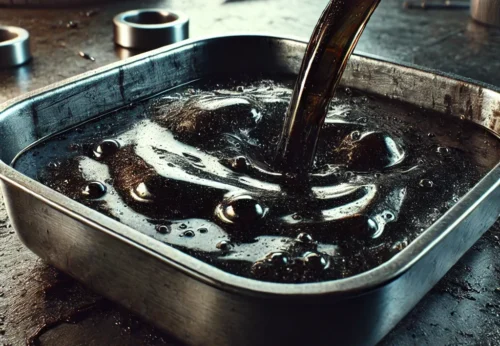
Regular oil changes are a vital part of vehicle maintenance, ensuring that your car runs smoothly and efficiently. Neglecting oil maintenance can lead to costly repairs, decreased performance, and even complete engine failure. Understanding the warning signs of oil-related issues can help you avoid these consequences and protect your vehicle warranty.
Sign #1: Check Engine Light or Oil Warning Light
One of the most immediate indicators that your car needs an oil change and vehicle maintenance is the appearance of the check engine light or oil warning light on your dashboard. These lights are triggered when sensors detect low oil levels, poor oil quality, or other engine issues related to oil. Addressing these warning lights promptly can prevent severe damage and maintain your vehicle’s performance. If you notice these lights, schedule an oil service with Pete Nelson Automotive to get complete details and a professional assessment.
 Sign #2: Dark or Dirty Oil
Sign #2: Dark or Dirty Oil
Clean oil is amber in color and has a smooth consistency, but over time, it can turn dark and gritty due to dirt and engine particles. Checking your oil’s color and consistency is simple: remove the dipstick, wipe it clean, reinsert it, and pull it out again to inspect the oil level and quality. Dirty oil can clog the engine oil filter, reduce lubrication, and cause significant engine wear. Routine maintenance, including regular oil changes and replacing the oil filter, ensures that your engine stays in peak condition. Pete Nelson Automotive offers multi-point vehicle inspections, including fluid levels and visual inspection, with every oil change service.
Sign #3: Unusual Engine Noises
If you’ve noticed ticking, knocking, or other unusual sounds coming from your engine, it could be a sign of inadequate oil levels or poor oil quality. Engine oil provides a protective barrier, reducing friction between moving parts. When the oil is old or insufficient, this barrier breaks down, leading to increased wear and tear. Over time, this can cause severe engine damage. Using quality motor oil, such as synthetic blends or oils suited for specific vehicle types, can mitigate these issues. Trust Pete Nelson Automotive to provide the right oil change options for your car, tailored to your driving conditions and vehicle manufacturer’s recommendations.
Sign #4: Oil Smell Inside the Car
A strong oil smell inside your car often indicates an oil leak or overheating engine oil. Leaks can occur from a damaged oil pan, worn gaskets, or improperly sealed components. This issue not only affects oil levels but can also pose safety risks, such as engine fires. If you detect an oil smell, check for visible leaks under the vehicle and monitor other fluid levels, including radiator fluid and brake fluid, to ensure your car’s overall health. Pete Nelson Automotive offers thorough inspections to identify and resolve such issues efficiently.
Sign #5: Reduced Fuel Efficiency
Dirty oil increases engine friction, making your car work harder and consuming more fuel. If you’ve noticed a drop in gas mileage, it could be due to degraded oil that no longer lubricates effectively. Routine oil changes using high-quality synthetic blend oils or other types of motor oil appropriate for your vehicle type can restore fuel efficiency. At Pete Nelson Automotive, we’ll ensure your oil service meets your specific needs, helping you save on fuel costs and maintain your car’s performance over time.
Conclusion
Recognizing the signs of oil issues—such as warning lights, dirty oil, engine noises, oil smells, and reduced fuel efficiency—is critical for maintaining your vehicle. Regular oil changes not only improve performance but also extend the life of your car and protect your vehicle warranty.
If you’ve noticed any of these signs, don’t wait. Visit Pete Nelson Automotive for a complete oil change service. Our skilled technicians provide multi-point vehicle inspections and tailor services to your car’s needs, ensuring it runs smoothly every time. Schedule your appointment today by calling us at 623-974-4723 and let us handle your vehicle maintenance with expertise and care.
FAQs
How often should I change my oil?
The frequency depends on your vehicle type, driving conditions, and the type of oil you use. Typically, oil should be changed every 3,000-5,000 miles for conventional oil and 7,500-10,000 miles for synthetic blends. Refer to your vehicle manufacturer’s guidelines for complete details.
What type of oil is best for my car?
The best oil depends on your vehicle’s make, model, and driving conditions. Options include conventional, synthetic, and synthetic blend oils. Pete Nelson Automotive can recommend the ideal oil type for your engine.
Can I change my oil myself?
While it’s possible to change your oil at home, professional oil change services include additional benefits like a multi-point vehicle inspection and proper disposal of old oil. Pete Nelson Automotive ensures a thorough and eco-friendly process.
What are the risks of not changing my oil on time?
Delaying oil changes can lead to engine overheating, reduced efficiency, and costly repairs. Regular maintenance helps avoid these risks and keeps your car running smoothly.
Are synthetic oils better than regular oils?
Synthetic oils offer better performance, longer intervals between changes, and improved protection for your engine, especially in extreme driving conditions. Discuss your oil change options with Pete Nelson Automotive to determine the best choice for your vehicle.
Does Pete Nelson Automotive offer other fluid checks?
Yes, Pete Nelson Automotive provides fluid checks for power steering fluid, automatic transmission fluid, windshield washer fluid, and differential fluids as part of routine maintenance. They also inspect air filters and cater to both standard and diesel engines, ensuring your vehicle stays in top condition.
What does an oil change service include?
An oil change service typically includes draining old oil, replacing the oil filter, adding fresh quality motor oil, and performing a visual inspection of key vehicle components to ensure optimal performance.


